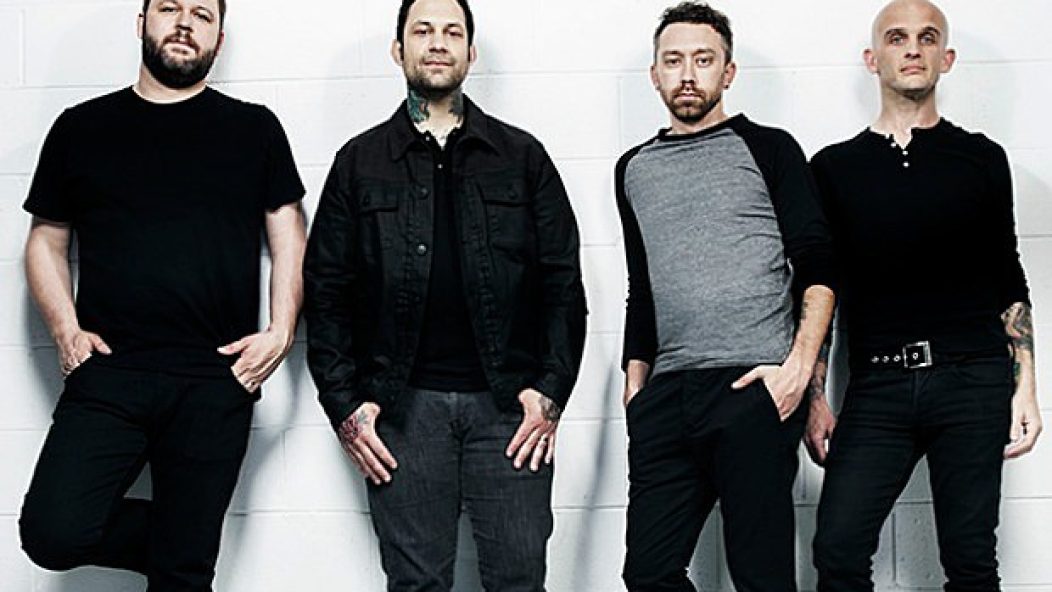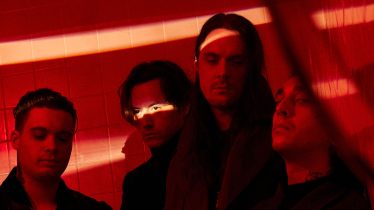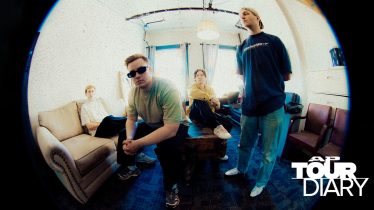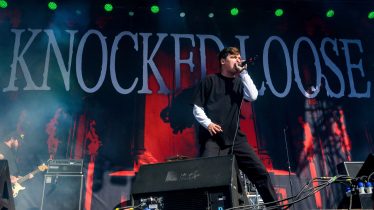
“There is no song for everybody”—Rise Against’s Tim McIlrath discusses their risky new album
Rise Against return July 15 with their seventh album, The Black Market, but some may be surprised at the lyrical and musical direction of the Chicago punk band’s new offering. The quartet returned to the Blasting Room studio in Fort Collins, Colorado, with producers Bill Stevenson and Jason Livermore and began the process of writing their most musically adventurous and lyrically personal album yet, something that took its toll on vocalist/guitarist Tim McIlrath. Whether their upcoming album will lose or gain fans is something that’s hard to predict, but the band are steadfast in their decision to constantly move in different directions. They’ve definitely achieved that on The Black Market.
AP recently talked to McIlrath about what inspired the album and the process of setting it apart from the rest of the band’s catalog.
INTERVIEW: Jason Schreurs
What inspired the writing of The Black Market?
TIM McILRATH: I didn’t have a lot of lyrics as we were writing the music. I was just singing melodies and not real words over a lot of it. I was trying to figure out what we were going to still say, seven records later, and what should still be relevant to be singing about, and I ended up doing a lot of inward writing. I started to really reflect on who we are as a band and what we do for a living and what we mean to people. The whole songwriting process was interesting, because we do these records, and we disturb these waters inside of us to create these records. And we churn them up, and sometimes those waters get really black when we churn them up. And then in between records the waters are calm. To create this record, I had to go in and churn the waters and make them black again. And it made me think about what a crazy endeavor it is to create songs where you are digging down in the dirt and getting it all over you to write the song.
It had more of an effect on me than it did in the past. A lot of artists have to go to a dark place to create their best artwork, and it just occurred to me that I’ve been going down to these dark places for 15 years now, and it was a moment of self-awareness, where I was thinking, “What is it that we do, or what do people expect or want from us? Where do we fit in their lives with the songs that we write?” I ended up not knowing what to write about, so I just wrote about that. I wrote about who we are as a band and what we do, and that turned into The Black Market. I was talking about the process of churning those waters, the process of writing a song, the process of getting dirty to create something that I could share with somebody that could potentially be a cathartic experience. So that’s where the title song came from, and a lot of the songs on the album focus around that.
What did that moment of self-awareness feel like?
At first it felt really painful and dangerous. It was like, “Why am I doing this? Why am I disturbing these waters?” It was almost like it was taking a toll on me. And then the more I thought about it, the more I realized this is inside all of us, and to get this stuff out was a cathartic experience. So the silver lining was how you deal with it. It was a form of therapy, and what I wanted to do on this album was confront all of it. I wanted to write lyrics about it, and I found myself thinking about things for the first time in 15 years, and the cost of writing lyrics in this band, and what that can mean. It all warped into all of these songs with that sort of theme.
How did the different lyrical direction affect the songs? I know you said the lyrics came after the music, but did it shift the songs at all?
Yeah, I think it did. The music was also written from a place of, “What else can we say that we haven’t said before?” So we were writing things that were a little different, and we were making different choices and saying, “Let’s not be afraid to write exactly what we want to write.” We don’t need to try and go for big choruses and rock sing-alongs if we don’t want to. We wanted to write the songs exactly how we heard them, and that’s what we did. And maybe that made the music a little more somber. It was a process that was really rewarding, because I felt like we were playing in ways that we’ve never played before, so everyone was stoked about that.
I noticed that you’re also playing with your vocal style on The Black Market.
I don’t really have a lot of control of my voice; it just comes out the way it comes out. It was the way I was singing, and Bill Stevenson and I talked about that before, and he agreed with me that we needed to maintain the rawness in my voice, and there were some songs where we almost tried to smooth it out too much. So on this record, I wanted to keep all of that grit, because I’m not a perfect singer; let’s not pretend I am. Let’s get all of the grit and crap that comes out when I’m singing, and the growl and the brokenness in my voice, let’s keep that all in. Some of the songs are really pretty songs, but I didn’t want them to be pretty vocally; I wanted them to be more raw. I also think I get a little more confident every year as a singer, so I’m willing to try different things and that’s what you hear on the record.
In some ways it reminds me of when Metallica’s Black Album came out and James Hetfield had this new swagger in his voice.
That’s interesting. I never really thought about that. But you’re right, I guess there are different tricks that I’m figuring out that I have in my toolbox, so I’m trying to use those. So that would be great if it turns into part of my arsenal and we can create a record that doesn’t sound the same as our last six. If so, mission accomplished.
Do you think being on the Revival Tour and doing a lot of the acoustic shows helped you develop more confidence in your voice?
I definitely learned a lot about my voice just going out there bare, with my acoustic guitar. It’s something I’ve always done in Rise Against, but never by myself. I remember being far more nervous to play for 200 people at a Revival show than 2,000 people at a Rise Against show. I remember just knowing that if I stop, the whole thing stops. If I screw up, everybody hears it. And it’s something that every singer or songwriter who plays an acoustic guitar onstage deals with, but it wasn’t something I was entirely prepared for. I was out there for two or three weeks, and only near the end did I feel comfortable. It made me really think about my voice a lot. I wouldn’t be surprised if that helped with this record. I prepared for that tour, too. I spent a lot of time just singing in my basement, so I’m sure that played a role on this record.
“I Don’t Want To Be Here Anymore” is the lead single for the album. Did the band bat that around quite a bit? It could be construed as having a negative or even damaging message, despite the song being about coming out the other end.
I never thought about the negative perception of the song until someone told me about it later. And I didn’t want it to be like that; I wanted it to be this escapist thing, that moment when you realize, “I’m not down with this environment that I’m in, this relationship I’m in, this world I’m in or this headspace I’m in, and I want to get out and escape.” And it was that moment of finally being fed up and saying, “Fuck this. I want out.” And to me it’s a really positive thing, especially if the thing you want out of is dangerous or damaging or negative. The song is about that moment. It’s not even about the answer; it’s about that moment of clarity, where you go, “I’m over this. Let’s move on from here.” So it didn’t really mean it as a negative thing, but I see how it could be construed that way. As far as it being the single, I don’t really care about what song we pick, to be honest. I always butt out of those conversations. Nobody listens to me anymore in the band, because I was the guy who voted to take “Savior” off Appeal To Reason. [Laughs.] So I lost all of my currency in conversations about what songs to pick. Singles, to me, are an introduction to your record, but they don’t mean anything more or less than every other song on the record, so I’m happy to defer to someone else. They’re all my babies, and whichever one becomes the gateway drug that hooks you and gets you into the record, I don’t really give a shit which one that is. I love all of them.
There are a few songs on The Black Market where I could see some old-school fans of Rise Against feeling alienated. Did you talk about that while writing the album?
Not every song is going to be for everybody. We have so many different factions of fans, and I love all of our audiences and we’re so lucky to have them, but at some point you do just kind of tune them out. It’s like how for some people, Siren Song Of The Counter Culture is their favorite album and the one they go back to, but for other people, it’s our “sellout” album and the one they hate, and only Revolutions Per Minute is their favorite, and anything after that is bullshit. You know what I mean? And then others say it’s only The Unraveling, and everything after our first album sucks and they can’t believe we’d even consider changing the band after The Unraveling. And you go on and on and on with these different generations of fans who come in at our different records, all the way down the line to our last one. At some point you realize, you can’t win that battle. There’s no pleasing all of those people. All you can do is turn to yourself and make the songs that you want, and know they may not be for everybody. There is no song for everybody. It’s what makes us feel good at the end of the day. The only pressure we feel is the pressure we put on ourselves. So we take risks and we’re far past the point of wondering what people will think of them. We just make choices with our guts, which is something we’ve done for awhile.
Do you remember how you felt the first time you sat down and listened to this album?
It took me a long time to listen to it after it was done, to be honest. It wasn’t like any of our other records, so we were kind of just bushwhacking into the forest, making it up as we went along. It was such an intense creative process and it was so exhausting that once we were done, I wanted nothing to do with the album for a long time. I haven’t listened to it front to back yet, but I listen to the songs and my favorite thing about it is I hear songs on it that don’t sound like songs on our other records. When you hear this record, you’ll know it’s part of The Black Market and you won’t mistake it for anything else. ALT







